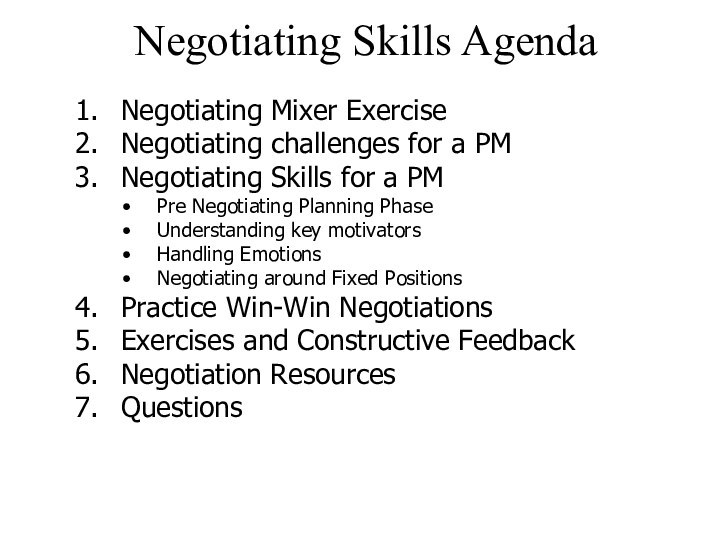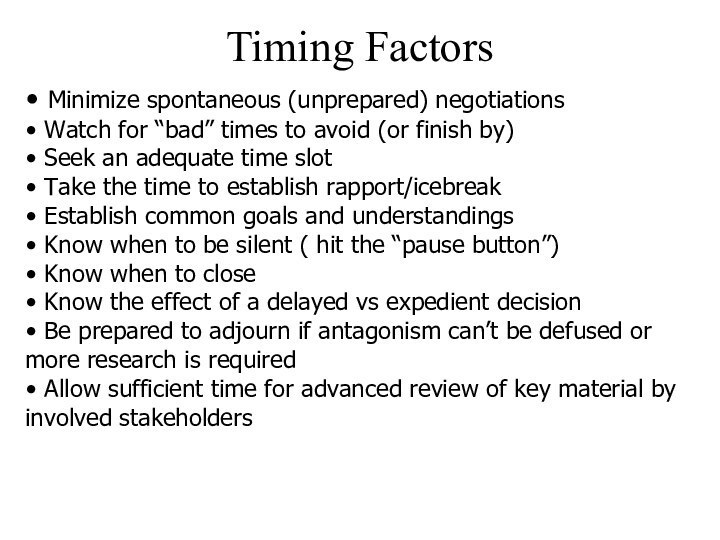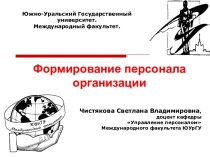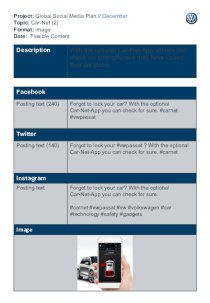Слайд 2
Negotiations Mixer
TASK: In your teams of 3 (or
4), negotiate with your partners to decide how you
would divide this $10 among you.
Once you have agreement, all 3 of you stand up.
Anyone not assigned to a team?
You have 60 seconds to negotiate. Are you ready to begin?
Go!
Who reached a win-win agreement in 45 seconds?
What made this a difficult task?
Слайд 3
Next time I suggest you try “Win-Win” Negotiating”
Слайд 4
Negotiating Challenges for a PM
Trade-offs between Scope, Time,
Costs, and Quality
“Build or buy” decisions
Change Management
Resource prioritizations
Catch-up and
Overtime needs
Contract overuns
Budget cuts
Vendor Selection
Bonuses and pay scales
Work Space and equipment
Risk Management strategies
Family and Friends
Other!
What do you consider to be your toughest challenge?
Слайд 5
The Pre-Negotiation Planning Phase
Decide if Subject Matter Expert
involvement required
Research options/issues and precedence's
Understand the motivators of affected
stakeholders
Know impact of each option (time, cost, quality, scope)
Risk/opportunity assessments
Timing issues (urgency, best time to meet, etc)
Summarize pros and cons
Cultural considerations (people and Enterprise)
Formulate strategy based on knowledge of the stakeholders
Pre-meeting info dissemination
Invite appropriate empowered representatives
Set conducive agenda, facilities, timeslot, and refreshments
Plan for timely post negotiation action
Plan for analysis of “lessons learned” after negotiating
Слайд 6
Some Negotiating lessons are tough to take...
Слайд 7
Understanding Key Motivators
Think back to the last time
you were blindsided by an unexpected motivator. What was
it?
Typical tangible motivators:
Fiscal impacts (Enterprise & for their own or department)
Workload/Overtime/training/vacation impact
Contractual/Organizational issues, etc
Less Tangible:
Desire to be heard and have their needs acknowledged
Desire to save face/look good in the eyes of others
Resistance to change (fear of unknown/untried)
Desire to satisfy their own or bosses hidden agenda
Biases, dislikes, ethnic customs, political alliances, etc
Emotional (and why should they trust you?)
TIP: Learn to read body language
Слайд 8
Handling Emotions
Emotional Challenges
Anger/exasperation
Insulted
Guilt
False flattery
Recommended Response
Allow venting. Probe for
why
What wouldn’t be insulting?
Focus on issues
Re-focus
Tips:
Don’t lose your
cool (remember the swan!).
Try to defuse with acknowledgement, empathy, patience, impartiality.
Consider dealing with less emotional issues first
Know your own “Hot Buttons”
Practice (consider Toastmasters, etc)
Слайд 9
Negotiating around Fixed Positions
Probe for the beliefs and
goals behind the fixed position.
Example of a fixed position:
“I will not agree to outsource, regardless of savings”
Surface goal: “Not to be burned the way we were 5 years ago”
Underlying belief: “Work is controllable if we do it in-house”
Underlying goals: To have control, stability, minimum risk, and not have to lay-off anyone.
Underlying realities: Managing this work in-house is a costly pain, and not our core skill. These people can be redeployed on urgent backlog.
Now you have the basis for analysis of alternatives, risks, contingencies, develop pros and cons, then negotiate!
Слайд 10
Practice Win-Win Negotiations
Establish rapport and common goals
Probe
for understanding of beliefs, goals, win-win options, and hidden
stakeholder motivators
Paraphrase for confirmation/affirmation
Analyse outcomes and risks
Summarize what was agreed on, and next steps (even if these are only “baby steps”)
Tips:
If stalled, back up to a fundamental that you can agree on (e.g. “We both want to make this a profitable venture”)
Build on this common ground (recycle if necessary)
Avoid emotional responses (even if insulted)
Consider interim options (or postponement) if undesirable outcome is imminent or key information is missing.
Слайд 11
Negotiation Resources
Books:
“Human Resources Skills for the Project Manager”
Vijay Virma
“Principles of Project Management” John R Adams
“The Power
of Nice” Ronald Shapiro
“Swim with the Sharks Without Being Eaten Alive” Harvey Mackay
“Getting Ready to Negotiate: The Getting to Yes Workbook” Roger Fisher and Danny Ertel
“Negotiating Skills for Dummies” Michael and Mimi Donaldson
Web Sites:
http://www.maxwidman.com/papers/negotiating
http://www.gantthead.com/Gantthead/JPACE/justifypages/1,1457,61,00.html
Info on Toastmasters International
http://www.toastmasters60.org/
http://www.toastmasters60.org/
More Info and De-Risking Projects:
Contact me at bill.chadwick@sympatico.ca
Слайд 12
Exercises
Form into teams of 3 (4 if
necessary).
Negotiations for a scarce resource
The person who’s birthday
occurs earliest in the year plays the role of the Negotiating PM. Next birthday is Susan’s Manager. The third (and fourth?) persons are Observers who note use/abuse of “win-win” techniques.
Background:
The Negotiating PM has a Programmer off sick, and wants to negotiate two weeks of Susan’s time to work on the Company’s most important project immediately, because Susan is the best programmer, and knows the tasks. Delays may affect everyone’s bonus.
Susan’s Manager is concerned the loss of Susan will mean she will not be able to complete tasks on another project their department is committed to deliver (requiring one week of work in the next 3 weeks), because the Negotiating PM has a reputation of over-utilizing resources (and padding their schedule contingency). Other commitments will also need juggling.
Time: 3 minutes
Слайд 13
Analysis of Exercise 1
Susan’s Manager’s: Who felt things
went very well? Why?
Observers: Lead a constructive discussion within
your team on the “win-win” techniques (2 minutes).
Established rapport and common goals?
Probed for understanding of beliefs, goals, win-win options, and hidden stakeholder motivators?
Paraphrased for confirmation/affirmation?
Analysed outcomes and risks?
Summarized what was agreed on, and next steps?
If stalled, returned to a fundamental that was agree on?
Built on this common ground?
Avoided emotional responses (even if insulted)?
Considered interim options (or postponement) if undesirable outcome was imminent, or key info missing?
Слайд 14
Exercise #2
Roles. PM from the previous exercise becomes
Anne, a 15 year old girl. The Observer becomes
Anne’s parent. Others are Observers to record use/abuse of “win/win” techniques.
Background: Anne is calling home from a payphone on Hwy 401 to tell her parent she is hitch-hiking to Hollywood to be a movie star. She has no money, is a little afraid, and secretly wants to go to drama school. The parent is worried about Anne being out after curfew. Parent picks up the ‘phone, and has 3 minutes to effect a “win-win” approach before the payphone times out.
Слайд 15
Analysis of Exercise 2
Anne(s): Who felt things went
very well? Why?
Observers: Lead a constructive discussion within your
team on the “win-win” techniques (2 minutes).
Established rapport and common goals?
Probed for understanding of beliefs, goals, win-win options, and hidden stakeholder motivators?
Paraphrased for confirmation/affirmation?
Analysed outcomes and risks?
Summarized what was agreed on, and next steps?
If stalled, returned to a fundamental that was agree on?
Built on this common ground?
Avoided emotional responses (even if insulted)?
Considered interim options (or postponement) if undesirable outcome was imminent or key information is missing?
Слайд 16
Exercise #3
Change roles. Anne becomes the Observer. The
parent becomes a driver who’s car has broken down
at a garage 2 hours away from Toronto. The last person becomes the head mechanic at the garage.
Background: You have to be in Toronto for an important meeting in 4 hours. The mechanic estimates it will take an hour to fix your car, but there are several local clients already expecting their cars to be fixed this morning. The mechanic wants your business, but does not want to let down any of the regular clients.
Time: 3 minutes
Слайд 17
Analysis of Exercise 3
Mechanics: Who felt things went
very well? Why?
Observers: Lead a constructive discussion within your
team on the “win-win” techniques (2 minutes).
Established rapport and common goals?
Probed for understanding of beliefs, goals, win-win options, and hidden stakeholder motivators?
Paraphrased for confirmation/affirmation?
Analysed outcomes and risks?
Summarized what was agreed on, and next steps?
If stalled, returned to a fundamental that was agree on?
Built on this common ground?
Avoided emotional responses (even if insulted)?
Considered interim options (or postponement) if undesirable outcome was imminent or key information is missing?
Слайд 18
Exercise #4
Rotate the negotiator role to be the
proud owner of a new sports car. Select someone
to be a good friend wants to borrow the car on Saturday.
Background: The Negotiator is not using the car this weekend, but is concerned the good friend is a fast driver. The friend is generous, and has done you several favours for the Negotiator, including a recent birthday gift.
Time: 3 minutes
Слайд 19
Analysis of Exercise 4
Good Friends: Who felt things
went very well? Why?
Observers: Lead a constructive discussion within
your team on the “win-win” techniques (2 minutes).
Established rapport and common goals?
Probed for understanding of beliefs, goals, win-win options, and hidden stakeholder motivators?
Paraphrased for confirmation/affirmation?
Analysed outcomes and risks?
Summarized what was agreed on, and next steps?
If stalled, returned to a fundamental that was agree on?
Built on this common ground?
Avoided emotional responses (even if insulted)?
Considered interim options (or postponement) if undesirable outcome was imminent or key info missing?
Слайд 20
Other
Know who will be in attendance, and
their issues
If you can, minimize the number of people
(especially
negative parties who are not essential)
Encourage capable advocates to attend
Make notes prior, and during
Other Websites
ConflictNet www.lgc.apc.org
DiploNet www.clark.net/pub.diplonet/diplonet.html
Negotiation Simulations www.bsos.umd.edu/icons/icons.html
Spousal www.webcom.com/pleasant.sarah.marriage/marriage/html
Peacemakers http://spider.lloyd.com/~fdelmer/
Harvard Law www.harvard.edu/vine/providers/program_on_negotiation/
Conflict http://info.rutgers.edu/RUSLN/cdispres.html
Peace Institute http://witloof.sjsu.edu/peace/conflict.html
Слайд 21
Know Your Hot Buttons
Exercise: List the last 3
times you felt someone pressed your “Hot Button”.
Слайд 22
Handling of Alternatives
Being Proactive with Alternatives can:
Help position the recommended solution
Reduce wheel spinning
Speed decision making
Increase Executive appeal and credibility
But there are dangers advancing alternatives…
If alternatives are premature or not well considered
If intangible motivators not satisfied
Trust not established
Tip:
maximize advanced dialogue with key interest groups
(except where prohibited).
Слайд 23
Common Negotiating Mistakes
Preparation/anticipation and listening are key!
Weak knowledge
of key motivators
Poor handling of Alternatives
Failure to fully acknowledge
the concerns of others
Impatience/ Poor timing
Allowing emotions to escalate
Negotiating with the un-empowered
Poor close
Слайд 24
Timing Factors
Minimize spontaneous (unprepared) negotiations
Watch for
“bad” times to avoid (or finish by)
Seek an
adequate time slot
Take the time to establish rapport/icebreak
Establish common goals and understandings
Know when to be silent ( hit the “pause button”)
Know when to close
Know the effect of a delayed vs expedient decision
Be prepared to adjourn if antagonism can’t be defused or more research is required
Allow sufficient time for advanced review of key material by involved stakeholders
Слайд 25
Location Factors
Seek a site conducive to negotiating:
Free from
interruptions/distractions/noise
Comfortable (seating, temperature, lighting, etc)
Appropriately equipped (flip chart? Table
space?)
Non-threatening (equitable seats, etc)
Culturally appropriate
Calming (soft tones, possibly carpeted)
Light refreshments (“breaking bread” together can be a clincher)























































